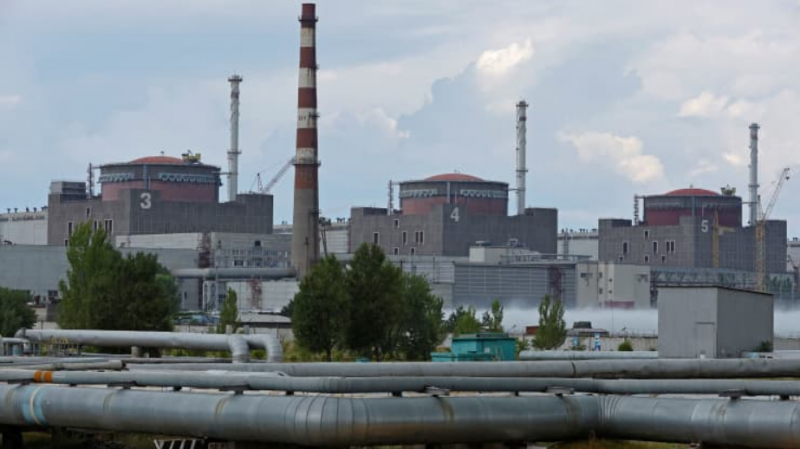
Russia: A UN nuclear watchdog team was on its way to Ukraine's Zaporizhzhya nuclear plant on Monday, as Russia and Ukraine traded allegations of shelling in the area, raising fears of a radiation disaster.
Zaporizhzhia, occupied by Russian troops in March but commanded by Ukrainians, has been a flashpoint in a conflict fought mainly in the east and south of Ukraine six months after Russia launched an invasion. changed.
With six reactors, Europe's largest nuclear power plant is strategically important to Ukraine's electricity supply.
Ukraine claims Russia is taking the plant hostage, stockpiling weapons and launching attacks around it, while Moscow accuses Ukraine of firing indiscriminately at the facility.
"We must protect the safety and security of Ukraine and Europe's largest nuclear facility," Rafael Grossi, director general of the International Atomic Energy Agency (IAEA), said in a tweet.
The IAEA chief posed with a group of 13 people wearing a cap and sleeveless jacket with the nuclear watchdog logo in his tweet.
He and the agency did not say when they would reach Zaporizhzhya, and Ukraine's energy ministry said it would not comment on the IAEA mission's visit "for security reasons".
Separately, the IAEA said the mission will assess physical damage, evaluate working conditions at the plant, and "determine the functionality of safety and security systems."
It will also "immediately take safeguards", which refers to tracking nuclear material.
The French presidency announced on 20 August after a phone call with Emmanuel Macron that Russian President Vladimir Putin had agreed to send a team of independent inspectors to the plant via Ukraine.
To ensure that nuclear power plants do not become a target, the United Nations and Ukraine have called for the withdrawal of military equipment and personnel.
In a country still haunted by the Chernobyl disaster, authorities in Zaporizhzhya are dispensing iodine tablets and teaching residents how to use them in the event of a radiation leak.
Ukraine's president's chief of staff, Volodymyr Zelensky, said on his Telegram channel late Sunday, the Russian military opened fire on Enerhodar, the city where the plant is located, along with a video of firefighters burning cars.
"They incite and try to blackmail the world," said Andrey Yermak.
The Ukrainian military had previously reported shelling in nine more cities on the other side of the Dnipro River.
Over the weekend, Russia's Defense Ministry reported additional Ukrainian shelling at the plant.
According to Russian Defense Ministry spokesman Igor Konashenkov, nine shells fired by Ukrainian artillery landed on the plant's grounds.
"At the moment, full-time technical personnel are monitoring the technical condition of the nuclear plant and ensuring its operation." "The radiation situation in the nuclear power plant area remains normal," he said in a statement.
According to Russian state media, authorities shot down a Ukrainian drone that was planning to attack the plant's nuclear waste storage facility.
Two reactors at the plant were disconnected from the electrical grid last week due to the shelling.
Ukrainian nuclear company Energoatom said it had no new information about the attacks on the plant.
The US State Department said on Sunday that Russia refused to acknowledge the serious radiological risk at the plant and blocked a draft nuclear non-proliferation agreement because it mentioned such a risk.
According to Ukrainian officials, Russian forces continued to shell the Donbass, an industrial stronghold of Ukraine in the east.
In a late-night video address, Zelensky promised that "the occupiers will feel their consequences in the further actions of our defenders."
No terrorist will be spared for attacking our cities. "Zaporizhia, Orikhiv, Kharkiv and Donbass will all get answers," he said.
According to the regional governor, Russian shelling has displaced more civilians to the east, where three-quarters of the population has fled the front-line region of Donetsk.
Ukraine's military said early Monday that Russia opened fire on military and civilian infrastructure in Donetsk near Bakhmut, Shumi, Yakovlivka, Zaytsevo and Kodema.
Russian air strikes on Sunday killed eight civilians in the Donetsk region, according to region governor Pavlo Kirilenko.
Russia denies intentionally targeting civilians.
The US and its allies have imposed harsh sanctions on Russia for its aggression and provided billions of dollars in security aid to the Ukrainian government.
Russia has said sanctions will never force it to change its position, and Western arms supplies will only prolong the conflict.
Ukraine's Foreign Minister Dimitro Kuleba will travel to Sweden and the Czech Republic this week to advocate for additional sanctions against Russia, including a visa ban for Russians in the European Union European Union's foreign ministers meeting this week are unlikely to unanimously support a visa ban for all Russians, according to Austria's ORF TV.
Ukraine: Nuclear risks highlighted by shelling at Zaporizhzhia plant
UK and EU putting on a brave face why Ukraine still runs for becoming the Europe's cemetery